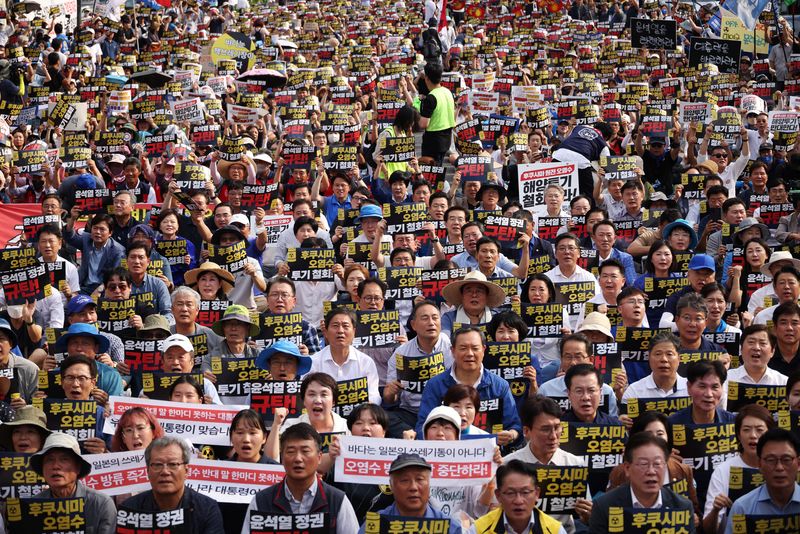
© Reuters. South Korean people chant slogans during a protest against Japan’s discharge of treated radioactive water from the wrecked Fukushima nuclear power plant into the Pacific Ocean, in Seoul, South Korea, August 26, 2023. REUTERS/Kim Hong-Ji
By Do Gyun Kim and Jimin Jung
SEOUL (Reuters) -Protesters gathered in the capital of South Korea on Saturday to demand that the government take steps to avoid what they fear is a looming disaster from Japan’s release of treated radioactive water from the Fukushima nuclear power plant.
Japan began dumping the water from the plant north of Tokyo into the sea on Thursday despite objections both at home and abroad from fishing communities and others worried about the environmental impact.
“We will not be immediately seeing disasters like detecting radioactive materials in seafood but it seems inevitable that this discharge would pose a risk to the local fishing industry and the government needs to come up with solutions,” said Choi Kyoungsook of the Korea Radiation Watch group that organised the rally.
About 50,000 people joined the protest, according to the organisers.
Japan and scientific organisations say the water, distilled after being contaminated by contact with fuel rods when the reactor was destroyed in a 2011 earthquake and tsunami, is safe.
The utility responsible for the plant, Tokyo Electric Power has been filtering the water to remove isotopes, leaving only tritium, a radioactive isotope of hydrogen that is hard to separate.
Japan’s fisheries agency said on Saturday that fish tested in waters around the plant did not contain detectable levels of tritium, Kyodo news service reported.
South Korea has said it sees no scientific problems with the water release but environmental activists argue that all possible impacts have not been studied.
“Nobody can tell what’s going to happen to the marine ecosystem in the next 100 years,” said Choi.
Japan says it needs to start releasing the water as storage tanks holding about 1.3 million metric tons of it – enough to fill 500 Olympic-sized swimming pools – are full.
The first discharge of 7,800 cubic metres – equivalent to about three Olympic pools – will take place over about 17 days.








